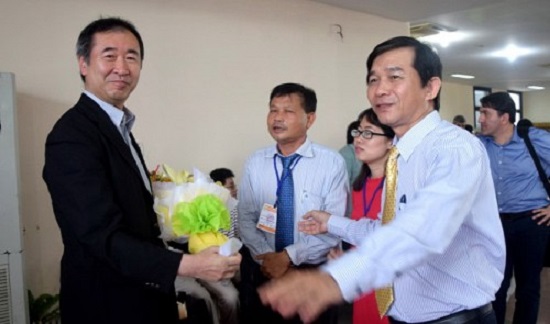Japanese Nobel winner in Vietnam to attend PASCOS 2016
A Japanese winner of the Nobel Prize in Physics arrived Sunday in Binh Dinh to attend a symposium held as part of the ongoing months-long “Rencontres du Viet Nam”.
Professor Takaaki Kajita, a physicist known for neutrino experiments who received the prestigious award last year, is among the participants of the PASCOS 2016, an international symposium on particles, strings and cosmology.
 |
| Professor Takaashi Kajita (L) is pictured in Binh Dinh Province on July 10, 2016. |
One of more than a dozen of separate workshops to be held during the 12th ‘Rencontres du Viet Nam’ (Meet Viet Nam), the 22nd PASCOS runs from Monday to Saturday at the International Center for Interdisciplinary Science Education (ICISE) in Quy Nhon.
The meeting aims to review and discuss recent progress in particle physics, string theory and cosmology.
Following important discoveries made within the last few years, including properties of neutrino mixings, the Higgs particle, and most recently gravitational waves, the event is set to bring together theorists and experimentalists to discuss what has been learned and what might show up in the next few years.
Professor Kajita said PASCOS is a high-quality and interesting conference of his field, thanks to the participation of many prestigious scientists. This is why he still traveled to Viet Nam despite his tight scheduled, the Japanese physicist underlined.
In 2015, professor Kajita and Arthur B. McDonald were awarded the Nobel Prize in Physics for the discovery of neutrino oscillation, which proves that neutrinos have mass.
PASCOS 2016 is held as parts of the “Rencontres du Viet Nam” meeting, a major science and education program with the aim of helping Vietnamese and Pacific-Asian scientists to establish contacts and exchanges with Western colleagues, including many Nobel laureates.
The meeting’s this year runs from June 26 to December 17, consisting of 13 separate seminars and workshops and three physics classes, at the ICISE.
(Source: Tuoitrenews)



